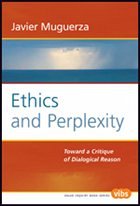Dialogical reason requires dialogue among the members of a community. Thinkers like Habermas and Apel have proposed that judgments of both fact and value become objects of public debate. The debate should determine whether these judgments can earn the assent of the community. If so, they attain a degree of intersubjective validity.Javier Muguerza's 'Ethics and Perplexity 'makes a highly original contribution to the debate over dialogical reason. The work opens with a letter that establishes a parallel between Ethics and Perplexity and Maimonides's classic 'Guide of the Perplexed.' It concludes with an interview that repeatedly strikes sparks on Spanish philosophy's emergence from its "long quarantine," as Muguerza puts it. These informal pieces-witty, informative, conversational-orbit the nucleus of the work: a formidable critique of dialogical reason. The result is a volume by turns vivid and profound.
Muguerza insists that the experience of perplexity is inseparable from the exercise of philosophy. Perplexity is linked to aporia and wonder, which the ancients identified as the origin of their activity. The only solidarity among philosophers is that of searching, and philosophy is hardly more than a set of questions unceasingly posed and posed again, of forever open problems, of perplexities that assail us over and over again. Perplexity avoids both the certainty of dogmatism and the ignorance of skepticism. In fact, it is the only philosophical ailment capable of immunizing us against both. Philosophy is always a guide to the perplexed.
Philosophy in Spain (PSP), founded to bring Spanish philosophy to the attention of English-speaking philosophers, seeks outstanding works by classic and contemporary Spanish thinkers as well as books on Spanish philosophy.
Table of contents:
Editorial Foreword
Author's Acknowledgments
Editorial Acknowledgments
Part One Introduction (Letter to Alicia Axelrod)
ONE Project for a New (Illustrated) Guide to the Perplexed
Part Two Toward a Critique of Dialogical Reason
TWO On the Intranscendental Nature of Reason
THREE Beyond the Social Contract (Fortunes and Misfortunes of Communicative Ethics)
FOUR Reason, Utopia, and Dystopia
Part Three Coda (Conversation with Ignatius M. Zalantzamendi)
FIVE Perplexities and Obstinacies
Works Cited
About the Author
Index
Muguerza insists that the experience of perplexity is inseparable from the exercise of philosophy. Perplexity is linked to aporia and wonder, which the ancients identified as the origin of their activity. The only solidarity among philosophers is that of searching, and philosophy is hardly more than a set of questions unceasingly posed and posed again, of forever open problems, of perplexities that assail us over and over again. Perplexity avoids both the certainty of dogmatism and the ignorance of skepticism. In fact, it is the only philosophical ailment capable of immunizing us against both. Philosophy is always a guide to the perplexed.
Philosophy in Spain (PSP), founded to bring Spanish philosophy to the attention of English-speaking philosophers, seeks outstanding works by classic and contemporary Spanish thinkers as well as books on Spanish philosophy.
Table of contents:
Editorial Foreword
Author's Acknowledgments
Editorial Acknowledgments
Part One Introduction (Letter to Alicia Axelrod)
ONE Project for a New (Illustrated) Guide to the Perplexed
Part Two Toward a Critique of Dialogical Reason
TWO On the Intranscendental Nature of Reason
THREE Beyond the Social Contract (Fortunes and Misfortunes of Communicative Ethics)
FOUR Reason, Utopia, and Dystopia
Part Three Coda (Conversation with Ignatius M. Zalantzamendi)
FIVE Perplexities and Obstinacies
Works Cited
About the Author
Index

